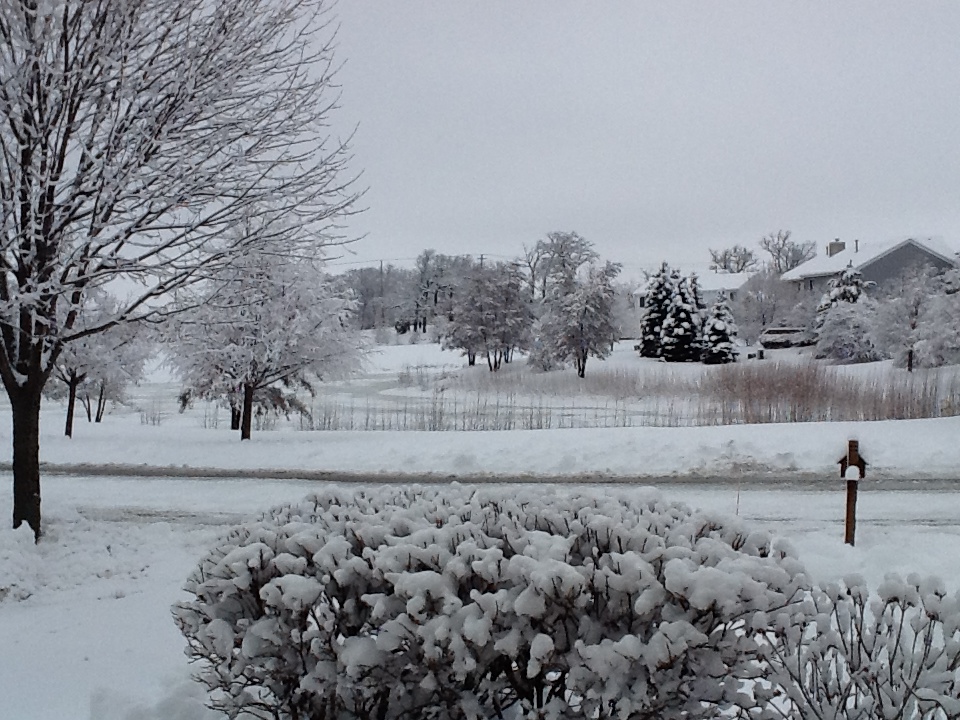Finding Joy in Winter
This is a picture from outside our front door in the northwest suburbs of Chicago. It’s winter time. I love living in Chicago for a variety of reasons. I love the city. I love the Midwest. I love the Autumn season. I love the Bears, Bulls, and Cubs.
But I hate winter. Always have. People think snow is charming and romantic. I hate shoveling it and trudging through it and the mess it creates for a commute. I hate the bitter cold weather that blows through your bones in February. I hate the traffic and the fact that people drive 25 miles slower when there are a few flurries.
So, if you haven’t noticed, I hate winter. And yet . . . . there is beauty in winter. Tremendous, awe-inspiring, breathtaking beauty. On Saturday I drove along a main road near our house, a road lined with homes, white fences, and tall pine trees. The site of this landscape blanketed by heavy snow is something you only see in places where there is winter, only during seasons when snowstorms occur, when the weather is cold enough to numb your appendages.
As I drove down that road, enjoying the wonderful picture, hating winter, something struck me. It’s simple and yet profound: we need winter in our lives, because there is a certain beauty that only winter, only seasons of hardship and pain, can produce.
The Bible says that it is God who creates the seasons. The psalmist Asaph writes:
You have fixed all the boundaries of the earth; you have made summer and winter. Psalm 74:17 (ESV)
The Scriptures often compare moments in our lives to seasons. The author of Ecclesiastes says there is a season for every phase of life: joy, sorrow, building, resting, planting, harvesting, etc. It is God who establishes those seasons, the sacred rhythms of life.
Which brings us back to winter. I find that my attitude toward Chicago winter is similar to my attitude toward the winter of suffering and hardship in life. I find that I don’t like these seasons very much. I find myself grumbling, questioning, waiting for the warm sun to break through the freeze and the frost. And yet . . . I find in those winter seasons a certain unexplainable beauty and joy that can’t be found when life is as I think it should be.
This must be why the writers of Scripture describe a joy in trials. Paul says: “I rejoice in my sufferings” (Colossians 1:24). Peter says, “Rejoice insomuch as you participate in the sufferings of Christ”(1 Peter 4:13-16). James writes, “Consider it pure joy when you face trials of various kinds” (James 1:2). Chuck Swindoll says this: “Deep, contended joy comes from a place of complete security and confidence [in God] – even in the midst of trial.”
There is another benefit of winter. I’m no farmer and so what I say here might be completely off. But I do know this. Without a winter, without a deep freeze and a without the heightened water table produced from the layer of snow, there is no harvest season. In life, without winter seasons, there is no fruit. I love what Elizabeth Elliot says:
Our vision is so limited we can hardly imagine a love that does not show itself in protection from suffering…. The love of God did not protect His own Son…. He will not necessarily protect us – not from anything it takes to make us like His Son. A lot of hammering and chiseling and purifying by fire will have to go into the process.
If you want to be like Christ, if you want to experience a deep sense of joy, you must embrace the winter seasons of life. You don’t have to enjoy the trial nor should you pursue suffering as some kind of false martyrdom. But it we can see winter for what it is: a temporary seasons of formation, we’ll not only endure, we’ll experience growth when harvest comes.
The beautiful thing about living in Chicago is that winter isn’t forever. Around the end of March and beginning of April, green shoots rise up in the barren soil, flowers begin to bloom, trees show signs of life. It’s a reminder that in every season, God is faithful, that not every winter lasts forever. And in another sense, the whole earth is in a winter, but spring is coming. The death and resurrection of Jesus was the first sign of spring, hope budding up among the barren landscape of a cursed creation. One day harvest will come, the King victorious, and the long winter of humanity will be over.
